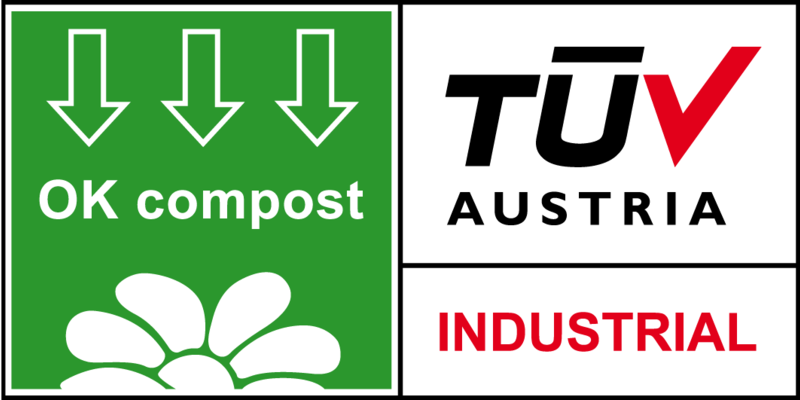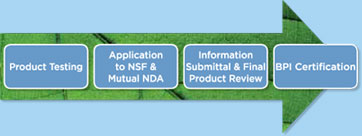Certifications
COMPOSTABILITY
Composting can reduce the volume of organic waste quite significantly, while the compost produced can be used for agricultural and horticultural purposes. About 50% of all domestic waste comprises organic material, a percentage that is set to grow in the future owing to the growing popularity of biodegradable products (packaging material, disposable cutlery and plates, …).

OK compost INDUSTRIAL (EN 13432)
Packaging or products featuring the OK compost INDUSTRIAL label are guaranteed as biodegradable in an industrial composting plant. This applies to all components, inks and additives. The sole reference point for the certification programme is the harmonised EN 13432: 2000 standard: in any event any product featuring the OK compost INDUSTRIAL logo complies with the requirements of the EU Packaging Directive ( 94/62/EEC).

Seedling Certified
TÜV AUSTRIA (formerly Vinçotte) is a certification body authorised by European Bioplastics and may therefore award the Seedling logo to products that are in compliance with EN 13432. By awarding both the OK compost INDUSTRIAL and the Seedling logo, TÜV AUSTRIA’s certificate holders have a way to give their compostable products recognition throughout the entire European market.

OK compost HOME
Owing to the comparatively smaller volume of waste involved, the temperature in a garden compost heap is clearly lower and less constant than in an industrial composting environment. This is why composting in the garden is a more difficult, slower-paced process. TÜV AUSTRIA’s innovative answer to this challenge was to develop OK compost HOME to guarantee complete biodegradability in the light of specific requirements, even in your garden compost heap.
OK compost HOME is not based on a standard but is the basis for several standards!
It seems important to remember that the OK compost HOME certification programme does not explicitly refer to a specific standard but details all the technical requirements that a product must meet in order to obtain the certification. It should also be remembered that, as a pioneer in this field, the requirements of the OK compost HOME programme, defined in 2003 and never questioned since then, have served as the basis for the drafting of several standards such as:
- Australia: AS 5810 (2010) – Biodegradable plastics - Biodegradable plastics suitable for home composting
- France: NF T 51800 (2015) – Plastics - Specifications for plastics suitable for home composting
- Europe: prEN 17427 (2020) - Packaging — Requirements and test scheme for carrier bags suitable for treatment in well-managed home composting installations
FOR MORE INFO: https://www.tuv-at.be/green-marks/certifications/ok-compost-seedling/
BPI Certified Compostable
Increasingly, the global market recognizes and favors products that help to protect and preserve the environment. A critical stage in a product life cycle is end of life and whether it can be put back into the environment. There is growing demand for compostable products and for credible compostable claims to rely on for sourcing and purchasing decisions.
The Biodegradable Products Institute (BPI) Certified Compostable program was developed to apply science-based testing to prove a material will compost in a municipal or commercial facility. The Certified Compostable program uses a specific set of testing criteria published by the American Society for Testing and Materials (ASTM). ASTM D6400 applies to plastic and standard ASTM D6868 is used with coated paper products or where polymers are used as binders. To pass the ASTM tests, a product must:
- Disintegrate quickly leaving no visible residue that has to be screened out
- Biodegrade fully or convert rapidly to carbon dioxide, water and biomass
- Result in compost that can support plant growth
- Not introduce high levels of regulated metals into the soil
BPI Certification process:

FOR MORE INFO: https://info.nsf.org/media/enews/bpi_compostable_landing.asp

Forest Stewardship Council
Certified Companies: Any organization with a valid FSC certificate is, with authorization, allowed to use one or all of these FSC trademarks – identifying that your products have been produced using material from responsible sources or to promote the fact that they are certified. If you already hold FSC certification and want more information about using these trademarks, contact your certification body or learn more here. Learn more here.







 Wishlist
Wishlist
 Cart
Cart